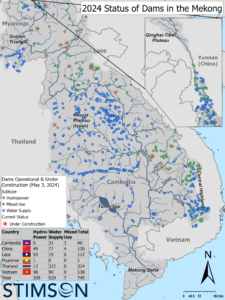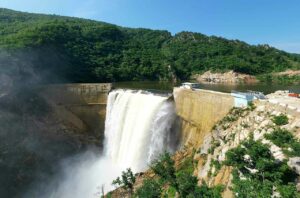An Ocean of Potential
Since its beginning in 2014 as a way to mobilize international attention and action on threats facing the world’s oceans, the Our Ocean Conference (OOC) has been unique among the many international conferences that crowd the calendar. At OOC, governments, civil society organizations, academia, and industry are on equal footing; conversations focus on concrete action. This is not a “talk shop” but a meeting where actions are recorded as official OOC commitments, which are tracked over the following years to hold key actors accountable.
The 9th Our Ocean Conference in Athens, Greece hosted 3,800 delegates from 119 countries. The delegates made 471 new commitments totaling over $11.3 billion for protecting marine ecosystems and sustainably managing crucial ocean resources. The European Union led the field with a $3.7 billion pledge to take 40 actions including supporting investments in sustainable fisheries and aquaculture and funding reforms to fight marine pollution. The United States announced more than $508 million in commitments to collaborate on marine spatial planning, sustainable blue economies, and coastal biodiversity projects.
The OOC has been a centerpiece in the global effort to protect ocean ecosystems that provide food security, support coastal protection, and sequester carbon. 47% of all marine protected areas (MPAs), covering more than 3 million square miles, have been announced at OOCs. During the closing ceremony, Professor Kristen Grorud-Colvert announced that 72% of MPAs and Area-Based Management commitments have been created and funded with an additional 24% in progress.
The Environmental Security Program team arrived in Athens with a packed three-day schedule filled with panels, meetings, brainstorming sessions, and receptions.

CORVI on Center Stage
On the second day of the conference, Director Sally Yozell spoke on the main floor of the conference to announce the Stimson Center’s partnership with the Government of Aruba and the kickoff of our 16th CORVI assessment. This new partnership “exemplifies the power of collaborative action in tackling complex climate challenges. But most importantly, when finished, the assessment will provide an integrated and detailed climate adaptation roadmap to implement sustainable solutions to safeguard the island’s blue economy, beautiful places, and the people of Aruba.”

Coming Together to Fight IUU Fishing
Collaboration between governments and civil society is also key to fighting illegal, unreported, and unregulated (IUU) fishing around the world. On the morning of the third day of OOC, Stimson hosted a meeting, alongside the Walton Family Foundation, at a beautiful waterfront venue overlooking the Saronic Gulf that brought together representatives from ten governments and 14 NGO supporters of the IUU Fishing Action Alliance. The United Kingdom reflected on the Action Alliance’s achievements to date, including the development of the IUU pledge and monitoring, control, and surveillance initiatives, and then handed the chairmanship of the Alliance over to Canada. Looking forward, Canada outlined three focus areas of their chairmanship: governance, enforcement, and partnerships. The Alliance also welcomed new members, such as Ghana, and discussed how collaborative action can help protect food and economic security, helping to fight hunger and poverty in the Global South. The Republic of South Korea who joined the IUU Fishing Action Alliance last year noted that as the host for the tenth OOC, they hope to increase the number of IUUF AA members and include capacity building for developing countries as a priority for those who want to join.

Director Sally Yozell and Hon. Mavis Hawa Koomson, Minister for Fisheries and Aquaculture Development, Ghana

Least Responsible, Most Impacted
30% of global oceans are made up of the exclusive economic zones of small island developing states (SIDS). These “big ocean states” rely on the ocean and its ecosystems to feed their people, power their economies, and protect their coastlines. Yet climate change, pollution, and overexploitation threaten ocean health and, in some cases, threaten the very existence of SIDS. In the afternoon of day 3, the Stimson Center and the Government of Belize brought together a diverse panel of leaders to discuss how the international community can support the efforts of coastal states to address these challenges.
Karen Sack from the Ocean Risk and Resilience Action Alliance, Dr. Nicholas Hardman Mountford from the Commonwealth Secretariat, and Gillian Caldwell from USAID discussed nature-based solutions, innovative finance mechanisms, and sustainable blue economies. Carlos Pol and Felicia Cruz provided a frontline perspective and highlighted how the government of Belize is pioneering innovative debt-for-nature swaps and other blue and green financing mechanisms. In fact, Belize’s 2021 Blue Bond led to a 12% reduction of GDP in debt, down from its peak of 125% that year.

To wrap up the official side events of the conference, representatives from the Environmental Security Program joined colleagues in support of the EU IUU Fishing Coalition, US IUU Fishing and Labor Rights Coalition, and IUU Forum Japan for a joint side event that highlighted transparency and traceability measures within fisheries management to combat IUU fishing and labor abuses. This panel was a mix of government representatives and included an interesting conversation about the progress made on seafood traceability solutions like the EU’s new fisheries regulations that can address IUU fishing in the seafood supply chain.
Looking Ahead
We still have a long way to go for ocean health and sustainability. Global efforts need to match the speed of climate change and although we have come a long way, we are still falling behind. Sea level rise, conflict over declining fish stocks, disrupted shipping routes, and increasing intensity of extreme weather events threaten the security of all nations. Many conversations in Athens also focused on the importance of 2025 for ocean conferences. The Economist World Ocean Summit will take place in March in Japan, followed by the 10th Our Ocean Conference in Busan, ROK in April, and soon after, the third UN Ocean Conference in Nice, France. Some have said there are too many conferences focusing on the ocean, but when you consider the ocean makes up 70 percent of our blue planet, we cannot let up our collaborative efforts to take action. Together, we can highlight the importance of ocean issues on the world stage and accelerate our progress in finding, designing, and implementing solutions.




